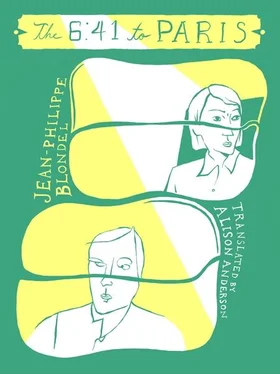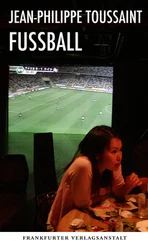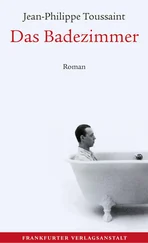Memories overlapping.
What an exhausting trip.
I didn’t need this.
The one thing I dream of, when we get to Paris, would be to find a hotel and sleep in an anonymous, comfortable room, where nobody would want anything from me. I would take the exit behind the Gare de l’Est, the one no one uses — Château-Landon — and book the first available room at the All Seasons, the elevator would be full of Japanese tourists out for a good time, and I would collapse on the bed. And when I woke up I’d be another person.
I really would like to be another person.
I’ve always wanted to be another person. Less disciplined. More intelligent. Brilliant. A meteor. Someone you see whiz by in the sky and you talk about them to your kids years later, all starry-eyed. Someone like Mathieu Coché. And yet it’s strange, when we were teenagers, you would never have expected anything like it. Mathieu was sort of my sparring partner. The guy who comes along with you to auditions to read you your lines, but who never gets chosen. I don’t know what made the difference. Adversity, perhaps. Nothing was easy for him back then, whereas for me, everything just landed in my lap — love, friendship, sex, it was all dead simple. Cécile Duffaut was actually the first girl who ever left me. How could she have done anything else?
I was unbearable.
I remember the end, in London. Don’t think I don’t. You might think you’ve forgotten everything, but that would be blatant hypocrisy. In fact, I’m convinced that people’s ability to remember is much better than they claim.
I wandered around, it was late afternoon. At first I was glad to be alone. At that age it’s hard to explain to the person you’re with that you might need solitude, that you don’t want to be glued to them twenty-four hours a day. This was the first time we’d been together for whole days at a time. In a foreign city. I suppose it could have brought us closer if we had really been in love. But that wasn’t the case. I say, “I suppose,” because the more time goes by, the more I wonder if I’ve ever been in love. It was as if I was wrapped in a thin layer of plastic that kept me apart from other people. But maybe it’s the same for everyone. Every human being must wonder what it means “to be in love.” What came closest, for me, was a desire to spend my everyday life with another person: morning breath, the coziness of a night without sex, breakfast for two and then for four, X-Factor programs on TV on Saturday evenings. I know there’s nothing at all exciting about any of that.
In fact, I could easily have shared my everyday life with Cécile Duffaut. We got along well. It’s just that when you’re twenty that’s not enough. You dream about things that’ll blow you sky-high, full of incredible passion, you want to be beside yourself with emotion and euphoria and pain, your heart beating wildly. You’re convinced that unless you’re experiencing all that you must be heading down the wrong path, and the relationship is not worth the effort.
And then after a while you realize it’s not going to happen.
So either you become resigned, or you make believe. You waltz around like some nineteenth century heroine, sighing, moaning, weeping — and you lie. And all around you, people call it love.
With Christine there was never any of that. No love at first sight. We hung out with the same group of friends. So we saw a lot of each other and eyed each other and circled around each other for months. I invited her to a party. We went home together. Everything flowed, it was all completely natural. Since then I’ve been thinking of love as something that flows.
Did it flow between Cécile and me?
Yes.
There’s a woman in her thirties a bit farther down the car; she looks tired. A child asleep with its head on her lap.
Yes.
An adolescent nodding his head, listening to some music the other passengers will never hear, but in his ears it’s exploding.
Yes.
An older man muttering to himself while he reads a magazine about the private lives of the rich and famous.
Yes.
And the two of us, sitting next to each other — we could have been a couple. We could have made believe.
But I’m not sure that Cécile Duffaut is the sort of woman who would make believe. She’s recognized me. She doesn’t want to speak to me. She’s right.
I was almost at the hotel. I could see her on the balcony. I didn’t feel like going in, explaining, negotiating, arguing. I thought she would have packed her bags. I went to a pub on the corner of the street. I don’t remember the name, just the color. Red, with gilded letters.
It was starting to fill up with locals. I drank three or four pints. Enough to tear down the language barrier. I fraternized with a group of Brits my age who were planning a trip to France to go girl-hunting, because it was a well-known fact, aah, those French girls, etc.
Jerks.
The kind you find in every country.
You find them mainly in bars, after office hours. Herds of guys, with their coarse laughter, spilling booze on their T-shirts, and saying they’ll do anything to get laid. I couldn’t understand half of what these guys were saying but it hardly mattered. I felt good. I was a jerk. I’m not saying this out of bitterness. Or out of scorn. It’s just a fact.
One of them was making racist jokes about Pakistanis, and I laughed like an idiot. Laughed, maybe, but I was uncomfortable all the same, because back in France I wouldn’t have put up with intolerance. Later that evening I spoke with this guy Andrew, who was quieter. He was getting drunk methodically, to forget that he hadn’t had a girlfriend in over a year. The two of us went on to a nightclub.
It was one of those unlikely sorts of discotheques that you sometimes come across in Anglo-Saxon countries. A church turned into a dance floor. A place of worship, for the body, for appearance. The atmosphere was distinctly different, depending on whether you were in the chapel or the nave. In the nave, the music took up all the space and the light was dazzling; it was crowded and it was hard to make your way to the bar. The bass was pounding in your ears and you couldn’t think straight. Andrew didn’t want to dance. He sat down on one of the wooden pews the designer had preserved. He guzzled beer after beer, staring into space. At one point, he vanished. I can still see his face, just as he was. I picture him married and divorced with one kid, the manager of a mobile phone outlet in a London suburb.
If I saw him in the street I wouldn’t recognize him.
Any more than I’d recognize Kathleen.
Of course not.
Two days later I had already forgotten her. On the train to Paris I thought about the three days that had just gone by and I could not call up her face. Just her dyed blonde hair: you could see the dark roots. Just the opposite of Cécile Duffaut. Cécile Duffaut would never have dyed her hair.
I wonder if Kathleen still feels embarrassed. If in a relaxed moment, say, when she’s at a barbecue with colleagues or in the car with her kids, she suddenly purses her lips and makes a face because her memory has swerved in that direction. Her husband, in the seat next to her, will look surprised. She’ll wave her hand as if to say, it’s nothing. Something she ate. She’ll take a tablet when they get home. It will pass.
And what about me, did it pass?
Yes, it did. That’s the worst thing about it.
I made up a whole bunch of stories.
That in France I was studying to become a helicopter pilot, to rescue stranded mountaineers. That sort of rubbish. And the more lies I told her, the more I started to believe it. At last I was becoming another person. Kathleen hadn’t lost that sulky look she had when I went up to her, but nor had she walked away. She couldn’t help but smile, sometimes, because of my accent. We were in the other room, in the chapel. It was much darker there, with red seats and dim lights. We could hear the music from the dance floor, muted, just the bass causing the walls to vibrate. Around us, only couples in various stages of intimacy. A back room in a church. The England I had hoped to see. Not the one where tourist couples wander through rooms in a museum or stroll through parks pointing at swans and daffodils.
Читать дальше












